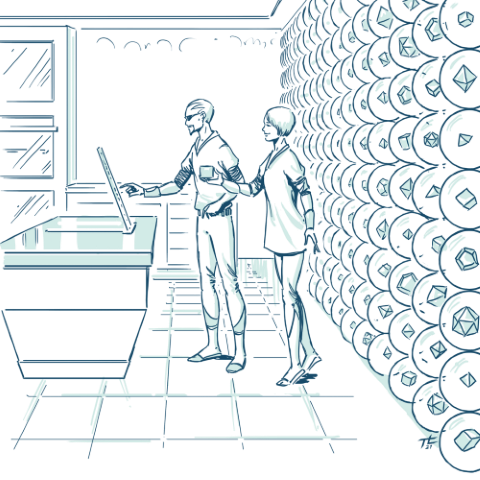From forecasting to strategic foresight
How modern Delphi illuminates plausible futures


Charting complex futures through structured dialogue
Strategic foresight and futures studies are essential disciplines for navigating profound uncertainty. They aim not to predict the future, but to explore a range of plausible futures, identify critical drivers of change, challenge our assumptions about tomorrow, and ultimately inform more adaptive and resilient strategies today. In this complex exploration, how can we effectively gather and synthesize the diverse, often conflicting, expert knowledge required?
While intuition and trend analysis have their place, the Delphi method, particularly in its modern Real-Time Delphi (RTD) form, offers a uniquely powerful framework for facilitating the deep dialogue and collective reasoning essential for robust foresight. Furthermore, in an age increasingly saturated with AI-generated analyses and scenarios, the need for robust human processes to establish shared values, interpret complex data collectively, and decide on desired futures becomes paramount. Structured methods like Delphi provide the essential space for this critical human deliberation.

Why Delphi excels in foresight (hint: it’s about insight, not just forecasting)
While Delphi has roots in forecasting, its core principles make it exceptionally valuable for the broader, deeper inquiries central to foresight and futures studies:
![]() Exploring uncertainty safely: Anonymity creates a psychologically safe space for experts to propose unconventional ideas, explore potential disruptions, or consider low-probability and high-impact events (“wild cards”) without fear of immediate critique or reputational risk.
Exploring uncertainty safely: Anonymity creates a psychologically safe space for experts to propose unconventional ideas, explore potential disruptions, or consider low-probability and high-impact events (“wild cards”) without fear of immediate critique or reputational risk.
![]() Structuring complex dialogue and reconciling conflict: Born at RAND during the Cold War specifically to manage disagreement and synthesize judgment among experts on complex, uncertain military-technological issues where authority or strong personalities could otherwise dominate, Delphi’s structured process provides a proven mechanism for navigating diverse viewpoints constructively.
Structuring complex dialogue and reconciling conflict: Born at RAND during the Cold War specifically to manage disagreement and synthesize judgment among experts on complex, uncertain military-technological issues where authority or strong personalities could otherwise dominate, Delphi’s structured process provides a proven mechanism for navigating diverse viewpoints constructively.
![]() Surfacing and scrutinizing assumptions: Delphi’s requirement for participants to justify their assessments forces underlying assumptions about trends, systems, and values out into the open. Making these explicit allows the group to examine, question, and understand the foundations of different perspectives on the future. This systematic surfacing of potentially vulnerable assumptions is critical for robust strategy, aligning conceptually with the diagnostic goals of Assumption-Based Planning (ABP).
Surfacing and scrutinizing assumptions: Delphi’s requirement for participants to justify their assessments forces underlying assumptions about trends, systems, and values out into the open. Making these explicit allows the group to examine, question, and understand the foundations of different perspectives on the future. This systematic surfacing of potentially vulnerable assumptions is critical for robust strategy, aligning conceptually with the diagnostic goals of Assumption-Based Planning (ABP).
![]() Synthesizing diverse knowledge: Foresight demands integrating technical, social, economic, environmental, political, and ethical perspectives. Delphi provides a container to gather these disparate inputs around specific foresight questions and facilitates cross-disciplinary learning.
Synthesizing diverse knowledge: Foresight demands integrating technical, social, economic, environmental, political, and ethical perspectives. Delphi provides a container to gather these disparate inputs around specific foresight questions and facilitates cross-disciplinary learning.
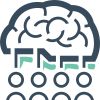
From forecasting to foresight: Delphi’s evolved application
It is crucial to understand that while early applications heavily emphasized point or probabilistic forecasting, the use of Delphi in modern foresight has evolved significantly. It’s now less about predicting what will happen and more about facilitating a collective exploration to:
![]() Evaluate trends, drivers, and uncertainties.
Evaluate trends, drivers, and uncertainties.
![]() Surface diverse perspectives and challenge dominant narratives.
Surface diverse perspectives and challenge dominant narratives.
![]() Support the development of qualitatively rich scenarios representing different plausible futures.
Support the development of qualitatively rich scenarios representing different plausible futures.
![]() Identify ‘weak signals’ or outlier views that might indicate future disruption.
Identify ‘weak signals’ or outlier views that might indicate future disruption.
![]() Build shared understanding and strategic alignment among diverse stakeholders regarding future challenges and desirable outcomes.
Build shared understanding and strategic alignment among diverse stakeholders regarding future challenges and desirable outcomes.

The power of Real-Time Delphi (RTD) for deeper foresight work
The evolution to Real-Time Delphi significantly enhances its utility for contemporary foresight practitioners, going far beyond just speed:
![]() Efficiency enables depth: RTD’s efficiency makes complex explorations feasible within practical project timelines and budgets, allowing resources to be focused on deeper analysis rather than cumbersome logistics.
Efficiency enables depth: RTD’s efficiency makes complex explorations feasible within practical project timelines and budgets, allowing resources to be focused on deeper analysis rather than cumbersome logistics.
![]() Dynamic engagement with complexity: The immediate feedback loop keeps experts more continuously engaged when grappling with multifaceted future topics.
Dynamic engagement with complexity: The immediate feedback loop keeps experts more continuously engaged when grappling with multifaceted future topics.
![]() Surfacing assumptions in real-time: The immediate visibility of others’ justifications allows assumptions embedded in arguments to be seen and challenged much faster.
Surfacing assumptions in real-time: The immediate visibility of others’ justifications allows assumptions embedded in arguments to be seen and challenged much faster.
![]() Analyzing plausibility and importance effectively: Modern RTD platforms provide tools to easily explore why ratings differ, helping identify key drivers behind assessments of what’s plausible or strategically critical.
Analyzing plausibility and importance effectively: Modern RTD platforms provide tools to easily explore why ratings differ, helping identify key drivers behind assessments of what’s plausible or strategically critical.
![]() Rich qualitative data capture: Advanced RTD platforms excel at capturing and organizing the vital justifications needed for deep foresight analysis.
Rich qualitative data capture: Advanced RTD platforms excel at capturing and organizing the vital justifications needed for deep foresight analysis.

Fostering futures literacy through the Delphi process?
Interestingly, a well-designed Delphi process can even cultivate competencies closely aligned with Futures Literacy (FL) – the capability to better understand the role the future plays in what we see and do. By engaging participants in exploring diverse perspectives, questioning assumptions, considering uncertainty, and reflecting on peer reasoning, Delphi becomes an active learning environment. However, realizing this potential requires careful framing: Facilitators must clearly communicate that the goal is not prediction, but mutual learning, exploring possibilities, and understanding the ‘why’. Furthermore, participants should be cautioned against equating high consensus with correctness, encouraging critical examination of agreement and exploration of alternatives – something advanced platforms might even prompt directly.

Next-generation platforms: Enabling foresight through deep interaction
Achieving deep foresight insights requires moving beyond basic RTD tools. Next-generation RTD platforms are crucial enablers:
![]() Making reasoning central and accessible: Platforms like 4CF Halnyx 2.0 prioritize making it effortless to explore the ‘why’ behind assessments.
Making reasoning central and accessible: Platforms like 4CF Halnyx 2.0 prioritize making it effortless to explore the ‘why’ behind assessments.
![]() Visualizing the possibility landscape: Visualizations help map the full distribution of opinions, argument clusters, and outlier views.
Visualizing the possibility landscape: Visualizations help map the full distribution of opinions, argument clusters, and outlier views.
![]() Supporting richer dialogue: Features enabling structured discussion or argument mapping allow for deeper collaborative exploration.
Supporting richer dialogue: Features enabling structured discussion or argument mapping allow for deeper collaborative exploration.
![]() Intelligent guidance: Helping participants navigate complex information efficiently ensures valuable insights aren’t overlooked.
Intelligent guidance: Helping participants navigate complex information efficiently ensures valuable insights aren’t overlooked.
These platforms provide the necessary environment to conduct the sophisticated, reasoning-focused dialogue that robust foresight demands.

Integrating Delphi: Amplifying foresight with complementary methods
While powerful on its own, Delphi rarely operates in isolation within a comprehensive foresight project. Its true strength often emerges when strategically combined with other tools and methods, where it provides structured expert judgment to enrich or validate other analyses:
![]() Trend analysis and extrapolation: While simple quantitative trend extrapolation can provide a baseline view of ‘what happens if current trends continue linearly,’ it inherently struggles with disruptions and novel changes, making it a limited foresight tool on its own. Delphi adds the crucial foresight layer: panels can rigorously assess the likelihood of that baseline continuation, identify potential bending points or disruptions, explore the wider impacts of the trend evolving in different ways, and debate its ultimate desirability, thereby enriching quantitative projections with essential qualitative judgment and expert reasoning.
Trend analysis and extrapolation: While simple quantitative trend extrapolation can provide a baseline view of ‘what happens if current trends continue linearly,’ it inherently struggles with disruptions and novel changes, making it a limited foresight tool on its own. Delphi adds the crucial foresight layer: panels can rigorously assess the likelihood of that baseline continuation, identify potential bending points or disruptions, explore the wider impacts of the trend evolving in different ways, and debate its ultimate desirability, thereby enriching quantitative projections with essential qualitative judgment and expert reasoning.
![]() Cross-impact and trend impact analysis (CIA/TIA): These methods model how different events or trends might influence each other. Delphi is frequently used to generate the initial expert probability assessments or to estimate the conditional probabilities (cross-impacts).
Cross-impact and trend impact analysis (CIA/TIA): These methods model how different events or trends might influence each other. Delphi is frequently used to generate the initial expert probability assessments or to estimate the conditional probabilities (cross-impacts).
![]() Scenario development: Delphi is invaluable both before and after scenario creation. It can identify key driving forces and critical uncertainties to structure the scenario logic, assess the plausibility and internal consistency of drafted scenario narratives, or explore potential strategies and their robustness within different scenarios.
Scenario development: Delphi is invaluable both before and after scenario creation. It can identify key driving forces and critical uncertainties to structure the scenario logic, assess the plausibility and internal consistency of drafted scenario narratives, or explore potential strategies and their robustness within different scenarios.
![]() Wild card and emerging issues analysis: Delphi’s anonymity encourages experts to consider low-probability, high-impact events (“wild cards“) or early “weak signals.” It provides a structured way to assess their potential implications and likelihood when quantitative data is scarce.
Wild card and emerging issues analysis: Delphi’s anonymity encourages experts to consider low-probability, high-impact events (“wild cards“) or early “weak signals.” It provides a structured way to assess their potential implications and likelihood when quantitative data is scarce.
![]() SWOT analysis: Delphi can bring rigor to identifying Strengths, Weaknesses, Opportunities, and Threats by gathering input from a diverse panel of experts/stakeholders, moving beyond internal brainstorming to incorporate broader perspectives, justifications and prioritisation.
SWOT analysis: Delphi can bring rigor to identifying Strengths, Weaknesses, Opportunities, and Threats by gathering input from a diverse panel of experts/stakeholders, moving beyond internal brainstorming to incorporate broader perspectives, justifications and prioritisation.
These are just examples; Delphi can similarly complement roadmapping, risk assessment, and many other techniques. The key principle is leveraging Delphi’s unique ability to systematically gather, structure, and refine expert judgment and reasoning to enhance the inputs or outputs of other foresight methods.

Structured insight for an uncertain future
Effective strategic foresight in today’s world demands rigorous methods to look beyond the obvious, challenge assumptions, and synthesize diverse expertise. While its roots are in forecasting, the modern Delphi method, especially when implemented as RTD on next-generation platforms like 4CF Halnyx 2.0, offers far more.
It provides an indispensable framework for structured dialogue, collective learning, and the deep exploration of reasoning needed to truly understand potential futures and inform resilient strategies. As AI contributes ever more information, the need for robust human processes like Delphi to make sense of it all, deliberate on values, and build shared strategic direction only grows. By focusing on facilitating genuine understanding rather than just chasing numerical consensus, modern Delphi equips us to navigate uncertainty with greater insight and shared purpose.
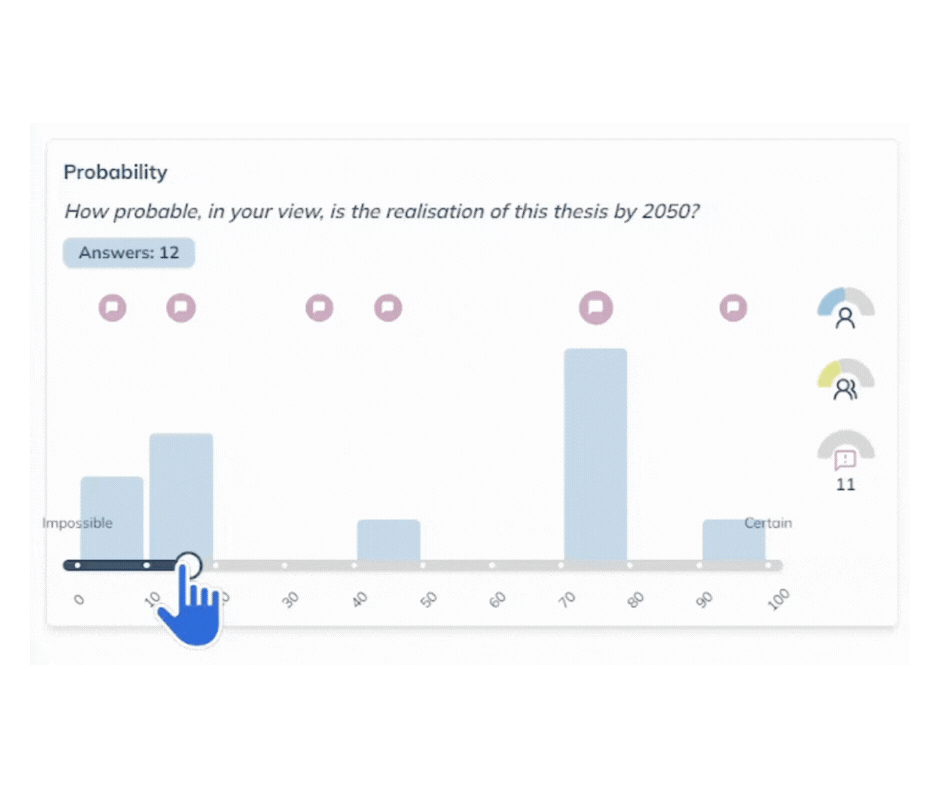
Experience the next generation of Delphi
4CF Halnyx 2.0 provides the intuitive, powerful, and insight-focused platform needed to conduct effective Real-Time Delphi studies that deliver meaningful results.
Interested in Delphi and RTD? Explore our expert series:
4CF Delphi Expert Series offers comprehensive insights, drawing on extensive experience, covering everything from the fundamentals to advanced applications and the crucial role of next-generation platforms. Whether you're new to Delphi or an experienced practitioner, explore these articles to deepen your knowledge and enhance your results.
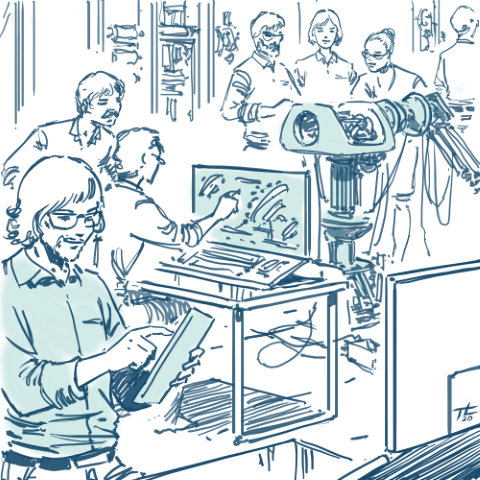

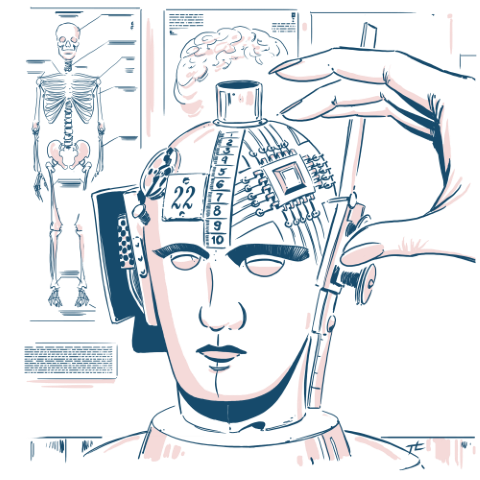
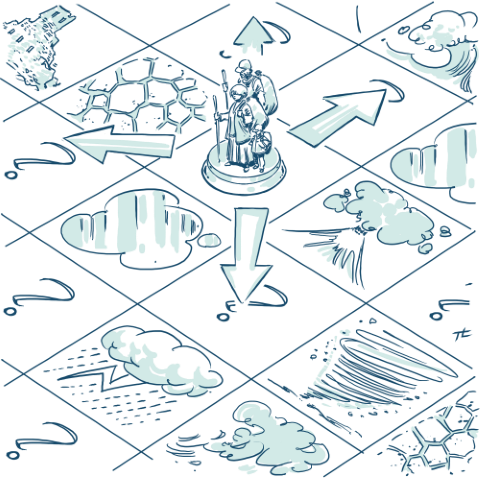

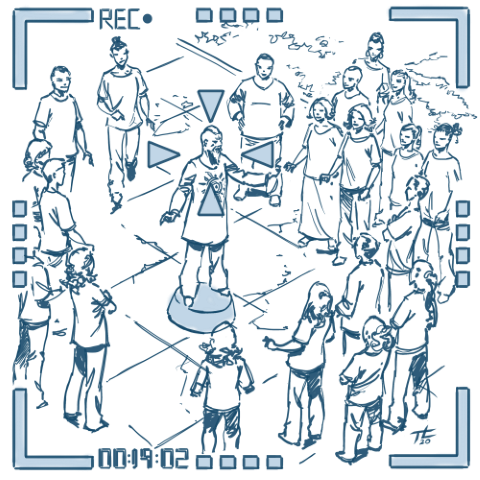
Explored these? Discover even more in our full Delphi series
Interested in Delphi and RTD? Explore our expert series:
4CF Delphi Expert Series offers comprehensive insights, drawing on extensive experience, covering everything from the fundamentals to advanced applications and the crucial role of next-generation platforms. Whether you're new to Delphi or an experienced practitioner, explore these articles to deepen your knowledge and enhance your results.
Explored these? Discover even more in our full Delphi series
Stay updated! Subscribe to our newsletter:
By subscribing to our newsletter, you consent to the processing of the provided data. The data controller is 4CF Sp. z o.o., its registered office is located in Warsaw, 10/14 Trzech Krzyży Square, postal code: 00-499.
We process your data solely for the purpose of sending information about 4CF Sp. z o.o. and its activities via e-mail. Your data will be processed until your consent is revoked through a link that will be included in each newsletter. The withdrawal of consent shall not affect the lawfulness of processing based on consent before its withdrawal. Providing your data is voluntary, but necessary if you wish to receive information about 4CF Sp. z o.o. and its activities. We may transfer the data to our suppliers of services related to the processing of personal data, e.g. IT service providers. Such entities process data on the basis of a contract with our company and only in accordance with our instructions. You have the right to request access to your personal data, its rectification, deletion or limitation of processing, as well as the right to lodge a complaint with the supervisory authority. More information about your rights and about the processing of your personal data can be found in our privacy policy.





